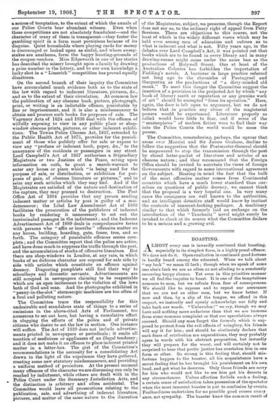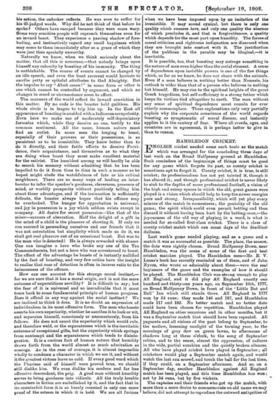BOASTING. A LMOST every one is inwardly convinced that boasting, especially
in its simplest form, is a highly penal offence. We dare not do it.. Open exultation in continued good fortune is hardly heard among the educated. When we talk about " my luck " we mean ill luck ; though when we speak of some one else's luck we are as often as not alluding to a constantly recurring happy chance. Yet even in this primitive manner we all feel the impulse to boast. It is one of the temptations common to man, but we refrain from fear of consequences. We should like to express and to repeat our assurance that we are not as other men, but we know better. If now and then, by a slip of the tongue, we offend in this respect, we instantly and openly acknowledge our folly and take back our words. "Unberufen!" we cry, though we may have said nothing more audacious than that we are immune from some common complaint or that our speculations always succeed. Should any man forget the formula which is sup- posed to protect from the evil effects of vainglory, his friends will say it for him ; and should he obstinately declare that such fears of retribution are superstitions, they may probably agree in words with his abstract proposition, but inwardly they will prepare for the worst,• and will certainly not be surprised to bear that poetic justice has overtaken him in one form or other. So strong is this feeling that, should mis- fortune happen to the boaster, all his acquaintance have a secret feeling that he has brought his punishment on his own head, and got what lie deserves. Only those friends are sorry for him who would not like to see him get his deserts in any circumstances. Unless affection forbids such a feeling, a certain sense of satisfaction takes possession of the spectator when the most innocent boaster is put to confusion by events. Foolhardiness undertaken for no possible good rouses annoy ante, not sympathy. The boaster knew the common result of
his action, the onlooker reflects. He was sure to suffer for hie ill-judged words, Why did he not think of that before be spoke P Others have escaped because they were more wary. Some very sensitive people will reproach themselves even for en inward boast. They experience a passing shadow of fore- boding, and instinctively regard any small happiness which may come to them immediately after as a grace of which they were just then specially unworthy.
Naturally we know, when we think seriously about the matter, that all this is nonsense,—that nobody brings upon himself any calamity by boasting of his immunity. The thing is unthinkable. The course of events cannot be changed by an idle speech, and even the least reverent would hesitate to ascribe petty or spiteful attributes to God Almighty. But the impulse to cry " Absit omen!" in some form or other is one which cannot be controlled by argument, and which no changes in creed or circumstance seem to affect.
The manners of the world reflect its inward conviction in this matter. By no code is the boaster held guiltless. His whole circle is in league to trip him up. In the East all appearance of boasting is avoided with a ludicrous scrupulosity. Even here we make use of moderately self-depreciatory formulas which, while they deceive no one, testify to the common sentiment. All the same, human nature must find an outlet. In some men the longing to boast, especially of their prowess or their possessions, is so persistent as to be irresistible. They know better than to do it directly, and their futile efforts to deceive Provi- dence, their acquaintance, and themselves as to what they are doing when boast they must make excellent material for the satirist. The humblest among us will hardly be able to search his memory without admitting that he has been impelled to do it from time to time in such a manner as he hoped might elude the watchfulness of fate or his critical neighbours. There are so many ways of leading an inter- locutor to infer the speaker's goodness, cleverness, presence of mind, or worldly prosperity without positively telling him about these advantages, and if the insinuation is sufficiently delicate, the boaster always hopes that his offence may be overlooked. The hunger for approbation is universal, and joy in possession is a joy which seldom exists except in company. All desire for secret possession—like that of the miser—savours of aberration. Half the delight of a gift in the mind of a child is the pleasure of showing it. If only we can succeed in persuading ourselves and our friends that it was not ostentation but simplicity which made us do it, we shall get real pleasure out of an occasional boast. But woe to the man who is detected! He is always rewarded with shame. One can imagine a hero who broke any one of the Ten Commandments, but not a hero who was accustomed to boast. The effect of the advantage he boasts of is instantly nullified by the fact of boasting, and very few critics have the insight to realise that ease of detection is often in inverse ratio to the heinousness of the offence.
How can one account for this strange moral instinct,— for we are sure that it has a moral origin, and is not the mere outcome of superstitious servility ? It is difficult to say; but the fear of it is universal and so ineradicable that it must trace back to some fundamental principle of human progress. Does it offend in any way against the social instinct ? We are inclined to think it does. It is no doubt an expression of individualism in its most offensive form. The man who boasts asserts his own superiority, whether he ascribes it to luck or wit, and separates himself, consciously or unconsciously, from his
fellows. He does not assert the superiority which would rule, feed therefore weld, or the separateness which is the inevitable outcome of exceptional gifts, but the superiority which springs from contempt and the separateness which tends to disinte- gration. It is a curious fact of human nature that humility draws forth from the world almost as much admiration as courage. As in the case of courage, it is almost impossible wholly to condemn a character in which we see it, and without
it the greatest virtues leave us cold. If every good word which the Pharisee said of himself were proved true, we should still dislike him. We even dislike• his modern and far less
offensive descendant, the prig. A good man without humility serves to bring goodness into ridicule. All the truly lovable
characters in fiction are embellished by it, and the fact that ip its counterfeit form it is so keenly resented is only one more proof of the esteem in which it is held. We are all furious when we have been imposed upon by an imitation of the irresistible. It way sound cynical, but there is only one quality which ensures love, and only one quality the absence of which precludes it, and that is forgivublenese, a quality which depends for the most part upon humility. The forces of moral criticism and righteous indignation are disarmed when they are brought into contact with it. The justification of the publican in the parable may be illogioal,—it is inevitable.
It is possible, too, that boasting may outrage something in the nature of man even higher than the social element. A sense of dependence upon invisible powers is one of the few things which, so far as we know, he does not share with the animals. Even if a man believes in nothing better than Nemesis, hie outlook is wider than that of a person who believes in nothing but himself. He may rise to the spiritual heights of the great Greek tragedians, but self-sufficiency is a strong tether which keeps its victims tied altogether to earth. The man without any sense of spiritual dependence must remain for ever utterly commonplace. These explanations only very partially explain why the corporate conscience of the world regards boasting as symptomatic of moral disease, and instantly applies to it the cautery of fear. Where all creeds, ages, and countries are in agreement, it is perhaps better to give in than to reason.











































 Previous page
Previous page